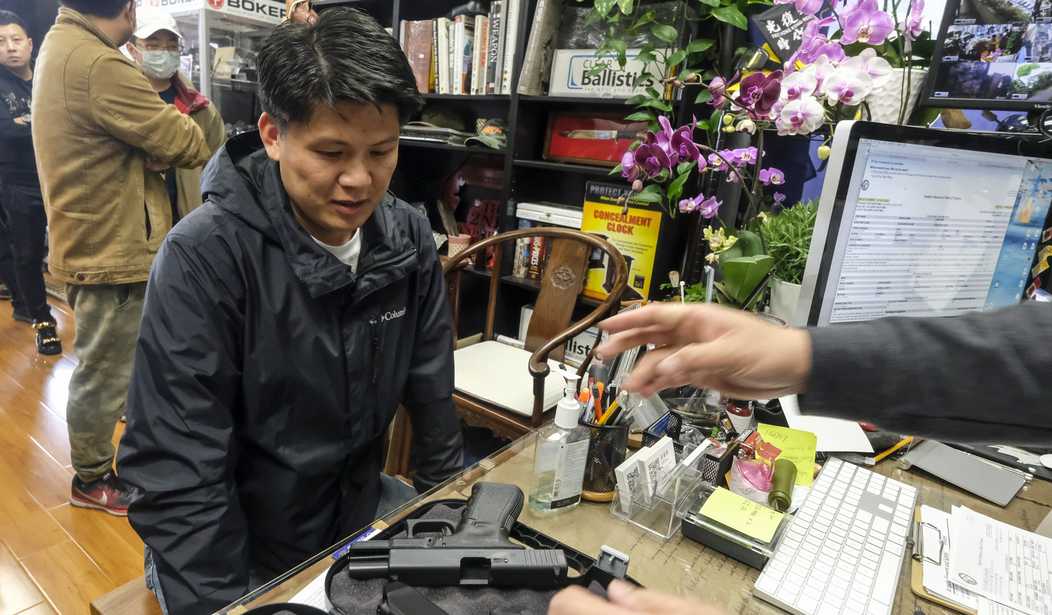Last year Maine lawmakers adopted a 72-hour waiting period for all firearm transfers as part of their response to the Lewiston shootings, even though a waiting period wouldn't have stopped the attack. The perpetrator of the shooting had purchased his guns months before, and despite concerns about his mental health from family, friends, and his superiors in the military as well as an inpatient stay at an Army facility, he was allowed to keep ahold of them, in large part because law enforcement never intervened despite multiple opportunities to do so.
Though the attack wouldn't have been stopped by a waiting period law, anti-gun Democrats in the state seized the opportunity to advance their ideology on the backs of the Lewiston victims and enshrined the 72-hour waiting period into law with the help of Gov. Janet Mills, who allowed the legislation to take effect without her signature.
In mid-November a coalition of gun owners, firearm instructors, retailers, and Second Amendment advocates filed litigation aimed at negating the new law in court, and now a Republican legislator is taking steps of his own to repeal the waiting period.
House Minority Leader Rep. Billy Bob Faulkingham, (R - Winter Harbor), is sponsoring a bill that would repeal the waiting period, arguing it's not constitutional.
... The intention of the law is to prevent suicide deaths in the state. Supporters say it provides a “cooling off” period to prevent people from acting impulsively.
The 72-hour waiting period is also the time it takes to run a federally mandated background check.
A National Instant Criminal Background Check (NICS) is usually completed in 30 seconds, but the FBI can take up to three business days to follow up if there are any issues. Under the Brady Law, if there's something in your record that needs further investigation, then the FBI has three business days (not including the day they run your initial background check) to get back to you. If the FBI doesn't either approve or deny you after three business days, then you can buy a gun.
Attorney Paul Clement, who's representing the plaintiffs in Beckwith v. Frey, argued in his initial complaint that the notion of a "cooling off" period "has no historical pedigree whatsoever—and, indeed, would have been 'unimaginable at the founding.'
To be sure, a few states adopted waiting periods to acquire a firearm in the early twentieth century to facilitate the advent of then-novel background checks, which at the time were a cumbersome and time-consuming endeavor. But some of those measures were abandoned as background checks became much easier to process, and federal law now takes the opposite approach, imposing a three-day limit on how long a background check may delay the acquisition of a firearm. Pure “cooling-off period” laws, by contrast, did not appear until the late twentieth century, and most of the few that are on the books date back only to the twenty first. That is not because it took two centuries to reach the unremarkable conclusion that some small number of the many people who seek to acquire firearms want to do so for illicit (and immediate) purposes. It is because generations of lawmakers have recognized that delaying the exercise of Second Amendment rights simply because the government is wary of anyone who wants to exercise them is fundamentally incompatible with the fundamental right to keep and bear arms.
While supporters of the law claim there's a salutary effect to keeping people from immediately obtaining their lawfully-purchased firearm, the plaintiffs argue that they've been harmed by the waiting period. Andrea Beckwith, for instance is described in the lawsuit as "a domestic-abuse survivor who has dedicated her life to helping other women who are trying to escape and recover from abusive situations."
Beckwith teachers self-defense classes to victims and survivors of domestic violence across the state, and as a certified firearms instructor she also often helps women quickly (and legally) obtain a firearm to defend themselves after given them the training they need. Clement says that Beckwith now must "send them home unarmed for three days—three days in which their abusers will now know that they cannot legally secure the means to defend themselves."
Nancy Coshow, another plaintiff, says she's had to spend hours traveling between her home and a gun store to acquire a firearm, even though she's already passed a background check and has owned other firearms for years. Other plaintiffs who are FFLs contend that since the waiting period law took effect, they've suffered "massive" declines in sales and revenue, putting their future at risk.
While a waiting period might be beneficial to someone who's considering taking their own life, it could also be deadly to someone who needs access to a firearm because of an imminent threat against their life. Given their ahistorical nature and the harms that they produce for victims of domestic violence and others with an immediate need to protect themselves, I don't believe that waiting period laws are compatible with our Second Amendment rights. I suspect a majority of the Democrat-controlled legislature in Augusta disagrees, however, and despite Faulkingham's attempt to repeal the law, it's the litigation brought by Mainers that has the best chance of undoing the needless delays.









